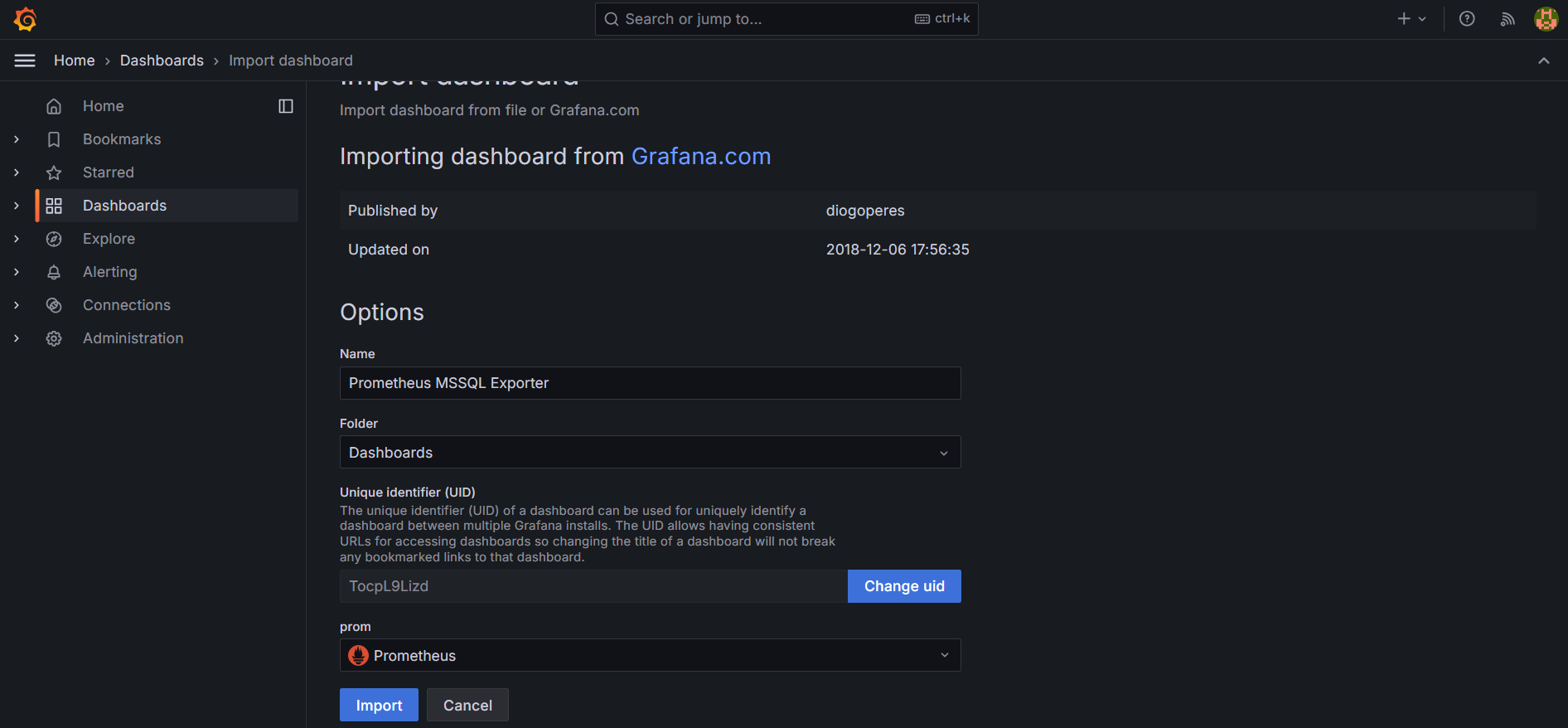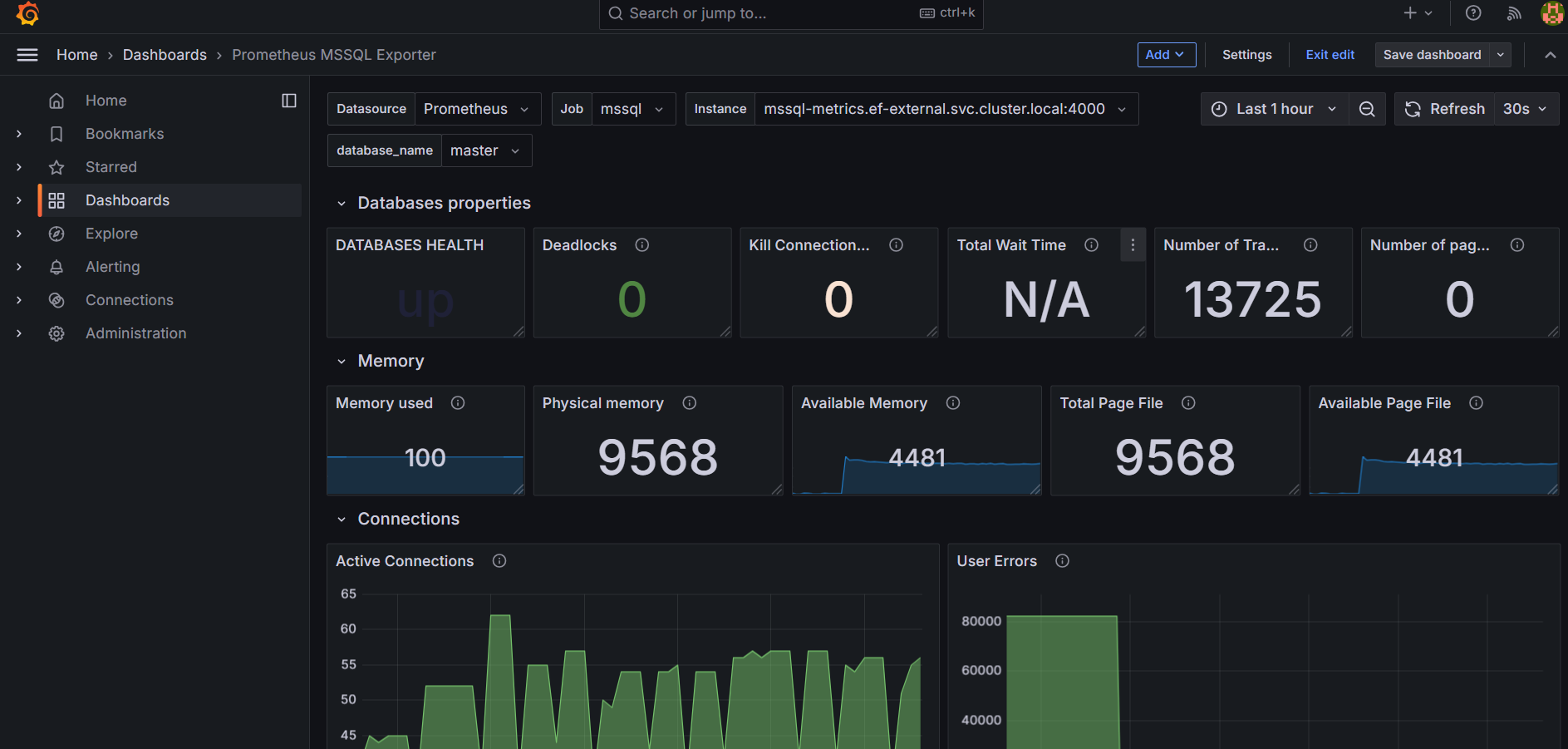For Helm-based deployment of MSSQL follow step 1. For standalone deployment of MSSQL, follow step 2.
Step 1: Update MSSQL Helm Chart
open the values.yaml file for MSSQL and update the following data:-
metrics:
enabled: true
image:
registry: docker.io
repository: awaragi/prometheus-mssql-exporter
tag: v1.3.0
digest: ""
pullPolicy: IfNotPresent
pullSecrets: []
service:
type: ClusterIP
port: 4000
annotations:
prometheus.io/scrape: "true"
prometheus.io/port: "{{ .Values.metrics.service.port }}"
extraArgs:
primary:
- --collect.auto_increment.columns
- --collect.binlog_size
- --collect.engine_innodb_status
- --collect.engine_tokudb_status
- --collect.global_status
- --collect.global_variables
- --collect.info_schema.clientstats
- --collect.info_schema.innodb_metrics
- --collect.info_schema.innodb_tablespaces
- --collect.info_schema.innodb_cmp
- --collect.info_schema.innodb_cmpmem
- --collect.info_schema.processlist
- --collect.info_schema.processlist.min_time
- --collect.info_schema.query_response_time
- --collect.info_schema.tables
- --collect.info_schema.tables.databases
- --collect.info_schema.tablestats
- --collect.info_schema.userstats
- --collect.perf_schema.eventsstatements
- --collect.perf_schema.eventsstatements.digest_text_limit
- --collect.perf_schema.eventsstatements.limit
- --collect.perf_schema.eventsstatements.timelimit
- --collect.perf_schema.eventswaits
- --collect.perf_schema.file_events
- --collect.perf_schema.file_instances
- --collect.perf_schema.indexiowaits
- --collect.perf_schema.tableiowaits
- --collect.perf_schema.tablelocks
- --collect.perf_schema.replication_group_member_stats
- --collect.slave_status
- --collect.slave_hosts
- --collect.heartbeat
- --collect.heartbeat.database
- --collect.heartbeat.table
once the values mentioned above are updated, upgrade the MSSQL helm deployment.
Step 2: Deploy MSSQL Exporter
Create a file mssql-exporter.yaml for mssql-exporter Deployment and Service and paste the content below. Also, update the values for environment variables.
apiVersion: apps/v1
kind: Deployment
metadata:
name: sql-exporter
namespace: ef-external
labels:
app: sql-exporter
spec:
replicas: 1
selector:
matchLabels:
app: sql-exporter
template:
metadata:
labels:
app: sql-exporter
spec:
containers:
- name: sql-exporter
image: awaragi/prometheus-mssql-exporter:latest
env:
- name: SERVER
value: "your-mssql-server"
- name: USERNAME
value: "your-username"
- name: PASSWORD
value: "your-password"
- name: DEBUG
value: "app"
- name: PORT
value: "1433"
ports:
- containerPort: 4000
---
apiVersion: v1
kind: Service
metadata:
name: mssql-metrics
namespace: ef-external
spec:
selector:
app: sql-exporter
ports:
- port: 4000
targetPort: 4000
Deploy the resources:-
kubectl apply -f mssql-exporter.yaml
Step 3: Update the Monitoring Solution Helm Chart
Update the following values in the Kube-Prometheus-Stack (Monitoring solution) helm chart.
additionalScrapeConfigs:
- job_name: mssql
scrape_interval: 30s
static_configs:
- targets: ['mssql-metrics.ef-external.svc.cluster.local:4000']
once the values mentioned above are updated, upgrade the monitoring solution.
Step 4: Add the MSSQL Dashboard
-
Open the monitoring solution via
{FQDN}/monitoringin your browser and log in. -
Head over to Dashboards and import dashboard with dashboard ID
9336. -
Select
Prometheusas the datasource and import the dashboard.

-
Once the dashboard is imported, select
mssqlin Job field to visualize metrics in the dashboard as shown below:-
